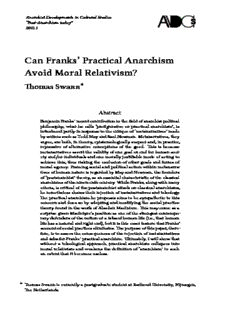
Can Franks' Practical Anarchism Avoid Moral Relativism? PDF
Preview Can Franks' Practical Anarchism Avoid Moral Relativism?
199 199 AnarchistDevelopmentsinCulturalStudies “Post-Anarchismtoday” 2010.1 Can Franks’ Practical Anarchism Avoid Moral Relativism? ∗ Thomas Swann Abstract BenjaminFranks’recentcontributiontothefieldofanarchistpolitical philosophy,whathecalls‘prefigurativeorpracticalanarchism’,is introducedpartlyinresponsetothecritiqueof‘metanarratives’made bywriterssuchasToddMayandSaulNewman.Metanarratives,they argue,areboth,intheory,epistemologicallysuspectand,inpractice, repressiveofalternativeconceptionsofthegood. Thisisbecause metanarrativesassertthevalidityofonegoalorendforhumansoci- etyand/orindividualsandonemorallyjustifiablemodeofactingto achievethis,thusriskingtheexclusionofothergoalsandformsof moralagency.Framingsocialandpoliticalactionwithinmetanarra- tivesofhumannatureisregardedbyMayandNewman,thefounders of‘postanarchist’theory,asanessentialcharacteristicoftheclassical anarchismsofthenineteenthcentury.WhileFranks,alongwithmany others,iscriticalofthepostanarchistattackonclassicalanarchisms, henonethelesssharestheirrejectionofmetanarrativesandteleology. Thepracticalanarchismheproposesaimstobesympathetictothis concernanddoessobyadoptingandmodifyingthesocialpractice theoryfoundintheworkofAlasdairMacInture.Thismaycomeasa surprisegivenMacIntyre’spositionasoneofthestrongestcontempo- rarydefendersofthenotionofatelosofhumanlife(i.e.,thathuman lifehasanaturalandrightend),butitisthisexactfeaturethatFranks’ accountofsocialpracticeseliminates.Thepurposeofthispaper,there- fore,istoassesstheconsequencesoftherejectionofmetanarratives andtelosforFranks’practicalanarchism.Ultimately,Iwillshowthat withoutateleologicalapproach,practicalanarchismcollapsesinto moralrelativismandweakensthedefinitionof‘anarchism’tosuch anextentthatitbecomesuseless. ∗ ThomasSwanniscurrentlyapostgraduatestudentatRadboudUniversity,Nijmegen, TheNetherlands. 199 199 200 200 200 ThomasSwann Introduction Inarecentcontributiontothefieldofanarchistpoliticalphiloso- phy,BenjaminFranksintroduceswhathedescribesas“aprefigura- tiveorpracticalanarchism”(Franks,2008: 147),intendedpartlyasa responsetothecritiqueofmoralandpoliticaluniversalismmadeby postanarchistwriterssuchasToddMay(1994)andSaulNewman (2001). Universalism,whichcanbeunderstoodasameta-ethicalcom- mitmenttooneover-archingmoralstandardagainstwhichclaimsof whatis‘good’and‘bad’canbejudgedtobe‘true’or‘false’,isargued, bythepostanarchists,tobebothintheoryepistemologicallysuspect andinpracticerepressiveofalternativeconceptionsofthegood. Ex- plainingsocialandpoliticalactionwithinauniversalistframework ofhumannatureisregardedbyMayandNewmanasanessential characteristicoftheclassicalanarchismsofthenineteenthcentury. WhileFranks(2007), alongwithothers(e.g., Cohn, 2002; Cohn& Wilbur, 2003; Glavin, 2004), is critical of the postanarchist attack onclassicalanarchisms,henonethelesssharesintheirrejectionof moraluniversalism. Thepracticalanarchismheproposesaimstobe sympathetictothistypicallypoststructuralistconcernwhileatthe sametimeprovidingafoundationforethicalaction,andhedoesso byadoptingthesocialpracticetheoryfoundintheworkofAlasdair MacIntyre. ThismaycomeassurprisegivenMacIntyre’sposition (1999: x)inrecentyearsasastaunchdefenderoftheideaofmoral universalism,basinghisaccountonaformofbiologicalessentialism wherebyhumanbeingsareunderstoodashavinganaturaltelos,an end towards which their actions ought to aim. However, Franks takeshisinspirationinsteadfromMacIntyre’sinitialworkonsocial practicetheory,whichechoespoststructuralism’srejectionofclaims touniversalmoraltruth(Franks,2008: 138). Inthisarticle,Iintendtodiscusstheimplicationsoftherejection ofmoraluniversalismforasocialpracticebasedaccountofanarchist ethics. Ifitisthecase,asthelaterMacIntyreargues,thatsuchan ethical theory is left lacking without a universal teleology that is commontoallsocialpracticesandwhichinformstheethicalactions oftheagentsinvolvedtherein,thenFranks’spracticalanarchismwill beopentocritique. Ultimately,Iwillshowthatwithoutanappeal touniversalism,practicalanarchismcollapsesintomoralrelativism and,inaddition,weakenstheverydefinitionof“anarchism”tosuch anextentthatitbecomesuseless. 200 200 201 201 CanFranks’PracticalAnarchismAvoidMoralRelativism? 201 1. SocialPracticesandtheRejectionofMoralUniversalism MacIntyre(1985: 187)describessocialpracticesinthefollowing, oft-quotedway: By ‘practice’ I am going to mean any coherent and complex formofsociallyestablishedcooperativehumanactivitythrough whichgoodsinternaltothatformofactivityarerealizedinthe courseoftryingtoachievethosestandardsofexcellencewhich areappropriateto,andpartiallydefinitiveof,thatformofac- tivity,withtheresultthathumanpowerstoachieveexcellence, andhumanconceptionsoftheendsandgoodsaresystemati- callyextended. ThetwomostimportantaspectsofthisdefinitionforMacIntyre’s ethicsasawholeare,firstly,thenotionofgoodsinternaltopractices and,secondly,thestandardsofexcellenceappropriatetothepractice. Thesecondofthese,thestandardsofexcellence,arespecificvirtues whichethicalagentscandisplay. Thefirst,theinternalgoods,are certain objectives of the practice which can only be achieved by the agent displaying a virtuous character. MacIntyre (1985: 191) writes,“Avirtueisanacquiredhumanqualitythepossessionand exerciseofwhichtendstoenableustoachievethosegoodswhich areinternaltopracticesandthelackofwhicheffectivelyprevents usfromachievinganysuchgood.”Thegoalofthisarticleisnotto assesstheconceptofvirtueorinternalgoodinMacIntyre’sorFranks’ ethics,butrathertoexaminewhatbothauthorsappealtoinorder toshowhowcertainvirtuesandcertaininternalgoodsarejustified morally. Inordertodoso,itisnecessarytotakealookathowsocial practicesoperateinthesocialworldofhumanbeings. Onewayto understandwhatMacIntyremeansbysocialpracticesistoexamine theparallelarguments,madebyLudwigWittgensteinamongothers (Midgely,1974;Winch,1958),thatthesocialworldiscomposedofa seriesofformationswhichhavemuchincommonwithgames. Wittgensteinfamouslycriticisestraditional,representationalist accountsoflanguagewhichhaveitasacollectionofwordswhich derivetheirmeaningthroughlinkinguptothingsintheworld;in otherwords,thatwordsarenamesforobjectivelyexistingmeanings. Allinstancesoflanguage,onthisaccount,canbeunifiedbecause they all represent the world, and the difference between two lan- guagesisthesameasthedifferencebetweentwosetsoflabels: they 201 201 202 202 202 ThomasSwann canbothbereducedtorepresentingthesamemeanings(Quine,1968: 186). Incontrasttothisrepresentationalism,Wittgensteinproposes thatlanguagebeunderstoodasoperatingasaseriesofgames,by whichhemeansanumberoflocallanguagecommunitiesinwhich meaningisdeterminednotbyhavingwordslinkupwithobjective reality,butbytacitagreementamonglanguageuserssuchthatthe useofwordsbyanyonememberofthecommunityisunderstood byanyother. Thisrelativismalsoappliestopracticesofjustification, whichmaybeappealedtointheeventofdisputesaboutmeaning;if languageusersdisagreeaboutthemeaningofastatement,thenthe justificatorypracticestheyappealtoaresimilarlyagreedontacitly andhavenospecialclaimtoobjectivetruth. Thecrucialpointtotake fromthisisthatastatementisnottobeseenassomethingwhichcan bejudgedas‘true’or‘false’inreferencetosomeexternalruler(i.e., objectivereality), butwhichachievesatruthvaluedependingon thespecificlanguage-rulesofthecommunity,orlanguagegame,in whichthestatementismade. Whatwarrantsthesesocialformations beingcalledgamesisthattheyoperateaccordingtoaspecificset ofrulesandthat,invirtueofthis,theyaresocialaffairsinvolving morethanonelanguageuser(Wittgenstein,2001: §256–71;Winch, 1958: 24–65). Socialpractices,forMacIntyre,sharethekeyfeaturesoflanguage games;namely,theyoperateaccordingtoaspecificsetofrules(spe- cific,thatis,tothatpractice),theyarenecessarilysocialandthey involvealocalorcontextualaccountoftruth. Acomparisoncanbe drawnbetweenMacIntyre’saccountofpracticesandthatofnarra- tivescommontotheworkofmanypoststructuralistandpostmodern writers. Forexample,Jean-FrançoisLyotard(1984:xxiv)writesthata definingfeatureofthecontemporary,‘postmodern’ageisarejection ofthebeliefinanyoneover-archingsystemthatcanjustifyclaims abouttruth. Thesegrandsystemshecalls‘metanarratives’. Inplace ofmetanarratives,likethatofrepresentationalism,postmodernism andpoststructuralismtheorisethesocialworldasapatchworkof localnarrativesinwhichtruthandjustificationoperateinthesame wayasinWittgenstein’slanguagegames. Whatisconsideredtrue inonenarrativeisonlyassessablewithinthejustificatorypractices ofthatnarrative,whicharebaseduponthetacitagreementofthe membersofthatnarrativecommunity,andnotinreferencetoameta- narrative. Lyotard(1984: xxiv)describesthispictureinexplicitly Wittgensteinianterms: “Therearemanydifferentlanguagegames— aheterogeneityofelements.”Whatisparticularlyinterestingabout 202 202 203 203 CanFranks’PracticalAnarchismAvoidMoralRelativism? 203 thetreatmentofmetanarrativesbypoststructuralistwritersisthe focusontheirethicalandpoliticaldimensions. Essentially,theysee the critique of metanarratives of justification as applying to both ontologicaltruthclaimsandmoraltruthclaims. Thus, moraluni- versalism(wherebystatementsaboutwhatis‘good’and‘bad’can beassessedinlinewithauniversalprinciple,suchasinthecaseof utilitarianismorthatofdeontologicalethics[see,e.g.,Franks,2008: 138–40])isrejectedandreplacedwithaviewaccordingtowhich moraltruthisspecifictolocalnarratives. Thisfocusonmoralrelativismisimportantbecauseitisthisfea- turewhichiscentraltoMacIntyre’searlyaccountofsocialpractices, represented best by his book After Virtue (originally published in 1981). MacIntyreagreesherewithboththelanguagegametheorists andthepoststructuraliststhatthesocialworldiscomposedofmul- tiplepracticeswithpotentiallyirreducibledifferences, andwhich cannotbesubsumedunderonemetanarrativeofmoraljustification. Afterprovidingexamplesofcompetingmoralclaimsaboutjustwar, abortionandprivateeducationandtheargumentsusedtojustify thoseclaims,hewrites(1985: 8): Everyoneoftheseargumentsislogicallyvalidorcanbeeasily expandedsoastobemadetobeso;theconclusionsdoindeed followfromthepremises. Buttherivalpremisesaresuchthat wepossessnorationalwayofweighingtheclaimsofoneas againstanother. Foreachpremiseemployssomequitedifferent normativeorevaluativeconceptfromtheothers, sothatthe claimsmadeuponusareofquitedifferentkinds. Thus,themorallandscapeofsocietyisoneinwhichdifferentnar- rativescontaintheirownjustificationsofmoralclaims. Forexample, onenarrativemayneverjustifywarfareasmorallygood,whilean- othermayjustifyitasgoodifandonlyifitiswagedwiththeaim ofliberatingoppressedgroups(MacIntyre,1985: 6). Thisisnotto say,ofcourse,thatmoralagreementbetweennarratives(eventhose separatedhistoricallyand/orgeographically)isimpossible,onlythat whenagreementisreached,itisonlycontingentandnotfounded uponsomeobjectivelyexistingmoralreality. Inhisearlywritingsonsocialpractices, MacIntyrearguesthat morality,ratherthanbeingbasedonsupposedlyuniversalprinciples, shouldtakerootintheteleologiesthatarefoundindifferentprac- tices. Hisclaimisthateverypracticeentailsateleologicalconception 203 203 204 204 204 ThomasSwann oftheagentsengagedthereinandthatthoseagentscanthuslyact inamoralway. Inactingtorealisethegoodendofhumanlife,“hu- man-nature-as-it-could-be-if-it-realised-its-telos”,agentscanactina morallypraiseworthyway. ThisdrawsonAristotle’sunderstanding oftelos,wherebythe‘good’endforhumanlifeissomethingnatural andcommontoallhumanbeings: telosisapropertyofa“metaphys- icalbiology”(MacIntyre, 1985: 162). However, fortheMacIntyre of After Virtue, this deep metaphysical commitment is misguided (asIwillhighlightbelow,MacIntyrehasretractedthispositionin recentyears). Instead,telosistobeconsideredapropertyofagents onlyinsofarastheyareengagedinpractices. Inonepractice, a particularformofagencyisconstituted, inanotherpractices, the formofagencyconstitutedmaybequitedifferent. Thesepractice basedformsofagencyincludeaparticulartelosfortheconstituted agent. Thus, a human being will, as they move from practice to practice,engageinthemasdifferentformsofagencywithdifferent telē. TouseMacIntyre’sexample(1985: 188),whenengagedinthe practiceofchess,apersonwillhavetheagencyofthechessplayer, withwhichcomesaparticulartelos,thatofdoinggoodintherole ofthechessplayer. Whatthisdoinggoodinapractice-specificrole consistof,accordingtoMacIntyre,isactingvirtuously. Therefore, ratherthanholdtoafixedtableofvirtues,MacIntyre’saccountofso- cialpracticesentailsdifferenttablesofvirtuesfordifferentpractices, eachinformedbythetelosspecifictotheformofagencyinvolvedin thatpractice(1985: 162–3). Whereateloscanbesaidtotranscend individualpractices,itisstillcontingentandapropertyofanagency commontoanetworkofpractices(MacIntyre,1994: 288). Thislatter pointwillprovetobeimportanttoFranks’practicalanarchism. 2. TelosorTelē Therejectionofasingle,fixedtelosissomethingMacIntyre’sand Franks’accountsofsocialpracticeshaveincommon. Franks’practi- calanarchismshareswithMacIntyretheperspective“thatthesocial worldisconstructedoutofintersectingsocialpracticeswiththeir ownhistoriesandtraditions”(Franks,2010: 155). Franks’(2008: 147) descriptionofpracticalanarchismisasfollows: 204 204 205 205 CanFranks’PracticalAnarchismAvoidMoralRelativism? 205 Practicalanarchismisbasedonasocialaccountofthevirtues (basedonarevisionofMacIntyre’svirtuetheory). Thisiden- tifiesgoodsasbeinginherenttosocialpractices,whichhave theirownrules, whicharenegotiableandalterovertime. It stressestheimmanentvaluesofparticularpracticesratherthan theexternallydecided(consequentialist)valuesthatwillaccrue. Inadditiontotherejectionofanover-archingteleologyofhuman life,therefore,practicalanarchismshareswithMacIntyre’saccount of social practices the idea of there being goods that are internal to practices. Franks writes too that “each anarchist practice pro- duces[its]ownstandards”,andthiscanbetakenasreferringtothe standardsofexcellence(virtues)inMacIntyre’stheory. Thus,both accountsofsocialpracticesalsoincorporatethenotionofvirtuous behaviour, the successful display of which can be seen in agents achievingthosegoodsthatareinternaltoaparticularpractice. To seetheimportanceofthisaccountofsocialpractices,andinparticu- larthenotionofteleologywhichiscentraltoit,itmaybehelpfulto rehearseFranks’argumentsagainstholdingasingle,fixedteleology; forhedoesnotfollowthelaterMacIntyreof,forinstance,Dependent RationalAnimals(1999)inreinforcingthenormativeforceofsocial practicetheorywithareturntoanAristotelianmetaphysicalbiology (MacIntyre,1999: x). Franks,inspiredbypostanarchistwritersbutalsoearlytwentieth century anarchists such as Errico Malatesta (e.g., 1977: 267) who arguessimilarlyagainstanyteleologicalaccountofhumanbeings, rejectstheideathatthereisonetelosagainstwhichallactioncan be judged as ‘good’ or ‘bad’. Instead, as the above section shows, hearguesformultipletelēsuchthatdifferentsocialpracticesand, asthecasemaybe, contingentnetworksofsocialpractices, have internalgoodsthat,fortheirachievement,demandthattheagentact virtuously. Thevirtuouscharacteristheteleologicalendformoral agency within that practice. Franks’ argument against positing a single,fixedteloscomesinthreeparts. Firstly,hearguesthatevenif therewereanobservableteleology,amoraluniversal,itwouldbe undesirableasitwouldlimitthemoralagencyofpeopleandgroups, andpotentiallyimposethecoercionthatanarchiststraditionallyseek toeliminate. Indeed,auniversalistaccountmakesroomfortherole ofmoralauthorities: individualsorgroupswhoareabletoindicate tootherswhatinternalgoodsandstandardsofexcellenceshouldbe 205 205 206 206 206 ThomasSwann pursued. Itischaracteristicofanarchisms(bothclassicalandcontem- porary)thatsuchauthorityberejected,regardlessofmeta-ethical commitmentstouniversalism. MikhailBakunin(1973: 134–5),for example,whoarguesfortheauthorityofscienceasamirrorofthe naturallawfoundinnature,stillrejectstheauthorityofscientists. “If thereareuniversal,setstandards,”writesFranks(2008: 141),“then moral agents would have to live up to these, and thus be denied thefreedomtodeterminetheirownvalues.”Thesecondargument madebyFranksagainsttheteleologicalpositionisthatitentailsthe potentialfortheintroductionofamoralhierarchy,becauseifthere isauniversalstandardofmoralconduct,andsomeagentsaremore capableofmeasuringuptothatstandardthanothers,theywillbe privileged. “Ruleswhichapplytoallregardlessofcontextignore, andthereforedisadvantage,thosewhoareinanunequalpositionto beginwith”(Franks,2008: 142). Thesefirsttwoargumentsaremoralinnature. Thefinalargument, on the other hand, is that a teleological and universalist position fallsonepistemologicalgrounds(Franks,2010: 144): A fixed concept of what it is to be human is epistemologi- callysuspect,asthereseemstobenoappropriatemethodology fordiscoveringwhatconstituteshumanity’suniversalquintes- sence. Noristhereanyagreementamongthosewhocommit toessentialismonwhatconstituteshumankind’sfundamental nature. ThisfinalargumentechoesthatofMacIntyreagainstthepositing ofasingletelos. Hewrites(1985: 162–3)thatuniversalism“ignores theplaceinourculturalhistoryofdeepconflictsoverwhathuman flourishingandwell-beingdoconsistin[.]”Indeed,MacIntyre(1985: 181–6)highlightsthenumerousaccountsofthegoodlifethatcanbe foundindifferentperiodsofhumanhistory. Withthesearguments in place, Franks rejects the universalist position that the internal goodsandvirtuesofparticularpracticescanbejustifiedinlinewith anobjectivemoralreality. However, as noted above, MacIntyre has, in the last ten years orso,performedanabout-faceontheissueofteleologyandnow arguesthatcontext-specifictelēarenotenoughtoprovidethemoral guidance agents require in dealing with conflicting practices and virtues(MacIntyre,2006: 262): 206 206 207 207 CanFranks’PracticalAnarchismAvoidMoralRelativism? 207 [I]tisonlybecausehumanbeingsasrationalanimalshavethe specificendthattheyhavethatquestionsabouthowtheshould acthavedeterminateanswers, answersthataretrueorfalse. Withdrawtheconceptofanendandthosemoraljudgements thatformerlypresupposeditwillcontinuetomimicjudgements thataretrueorfalse,butwillinfactonlyfunctionasexpressions ofattitude. [...]Tospeakoftheendofhumanbeingsistospeak ofthegoodstowhichtheyaredirectedbytheirnature[.] MacIntyre’scurrentposition,therefore,isthatforsocialpractice theorytoavoidmoralrelativism,wherebystatementsaboutwhatis rightandwronghaveasmuchclaimtoobjectivetruthasstatements aboutwhatisfashionableinclothingormusic(i.e.,theirtruthvalue isdeterminedbycontingentagreementamongthemembersofthe practice-community),itmustpositauniversaltelosforhumanbe- ings in general. This telos can thus be used to help agents decide definitivelyandcorrectlybetweenpracticesandvirtuesthatmay conflict. Franks’ practical anarchism, given that it rejects such a universalism,wouldseemtobeopentothechargeofrelativism. I willnowattempttoshowthatthisisinfactthecaseand,further- more,thatthisposesapotentialproblemfortheadoptionofanon- universalistsocialpracticetheoryasananarchistethics. 3. MoralRelativism WhileFranksrejectsasingletelosthattranscendsdifferentprac- tices, he also notes that for deliberation in ethics to exist in any meaningfulwayatall,theremustbe“asharedmoraldiscoursethat canevaluateandselectbetweenrivaltacticaloptions”(Franks,2008: 145). Theproblemisthathisrejectionofateloscommontoevery agentoreverycontextisthatthismoraldiscoursebecomesincredi- bleproblematic. Toseewhythisisthecase,Iproposetointroduce anexample. Supposethatananarchistcollectivewhichrunsaso- cial centre comes to a disagreement in the course of one of their monthlymeetings. Someofthemembersclaimthatthecollective should provide a subsidy to a direct action group involved in the animal rights movement, while the others claim that the subsidy shouldgotoananti-racistorganisation. Eachoptionentailsadif- ferentinternalgoodandsoadifferentvirtue. Iftheuniversalistis rightandthereisafixedtelos(orsetoftelē),andthemembersof 207 207 208 208 208 ThomasSwann thecollectiveareawareofthistelos(orsetoftelē),thentheywillbe abletomeasuretheconflictinggoodsagainstthisobjectiveyardstick anddecidewhichgoodtakespriorityatthattime. However,without suchanexternalguide,deliberationseemsmeaningless. Ifthefirst groupclaimsinsupportoftheirpositionthatitmeasuresuptothe contingenttelosthatsolidarityshouldbeprimarilywiththeanimal rightsmovement,andthesecondgroupclaimsthattheirsmeasures uptothetelosthatsolidarityshouldbewithanti-racism,thenthere isnowayforagreementtobereached. Itisimpossibletoorderthe potentialgoodsofpractices. Furthermore,evenifsomeagreementis made,wereathirdpartytoquestiontheprioritisingofoneinternal goodoveranother,nosupportcouldbegivenexceptfromwithin thepractice,whichbegsthequestion. Ultimately,itwouldseem,thereisnowayofresolvingconflict betweengoodsandvirtues, orbetweenpractices. Thishighlights thepracticalproblemwithrejectionanobjectivetelosintheway thatpracticalanarchismdoes. Theethicaldimensionsofthistheory arereducedtomoralrelativism. Frankswantstoproposeapoint betweenmoralrelativismandmoraluniversalism,butitseemsthat this point isn’t to be found. Of course there can be a telos that spansseveralinterconnectedpractices,butthiswouldbesimilarly contingentandwouldstillnotaidtheagentindecidingwhetherto engageinonegroupofpracticesoranother. This last point is especially pertinent to Franks’ practical anar- chism, because in some places he seems to arguing that certain practiceswillshareacommonteleologythatdistinguishesthemas anarchist practices; namely, that they aim to challenge and elimi- natehierarchicalandcapitalistrelationships. Forexample,hewrites (2010: 146) that “anarchist prefigurative methods are identifiable astheyarethetypesofpracticesthatwouldcollectivelybuildup tocreatetheiranti-hierarchicalversionoftheflourishingsociety.” Indeed,heoffersadefinitionof“idealtype”anarchismasinvolving therejectionofcapitalismandthefreemarketandhavinganinterest inthefreedomofothersaspartofcreatingnon-hierarchicalsocial relations(2006: 112–13). However,heisconsistentwithMacIntyre’s earlytakeonsocialpracticesinthathestressesthatthissharedtele- ologyiscontingent,andnotsomethingnecessaryorevenessential tothosepractices(2010: 142): Thisisnottosaythatanidenticalteleologyexistsacrossthe rangeofanarchisms;indeedacarefulreadingwouldidentify 208 208
Description: